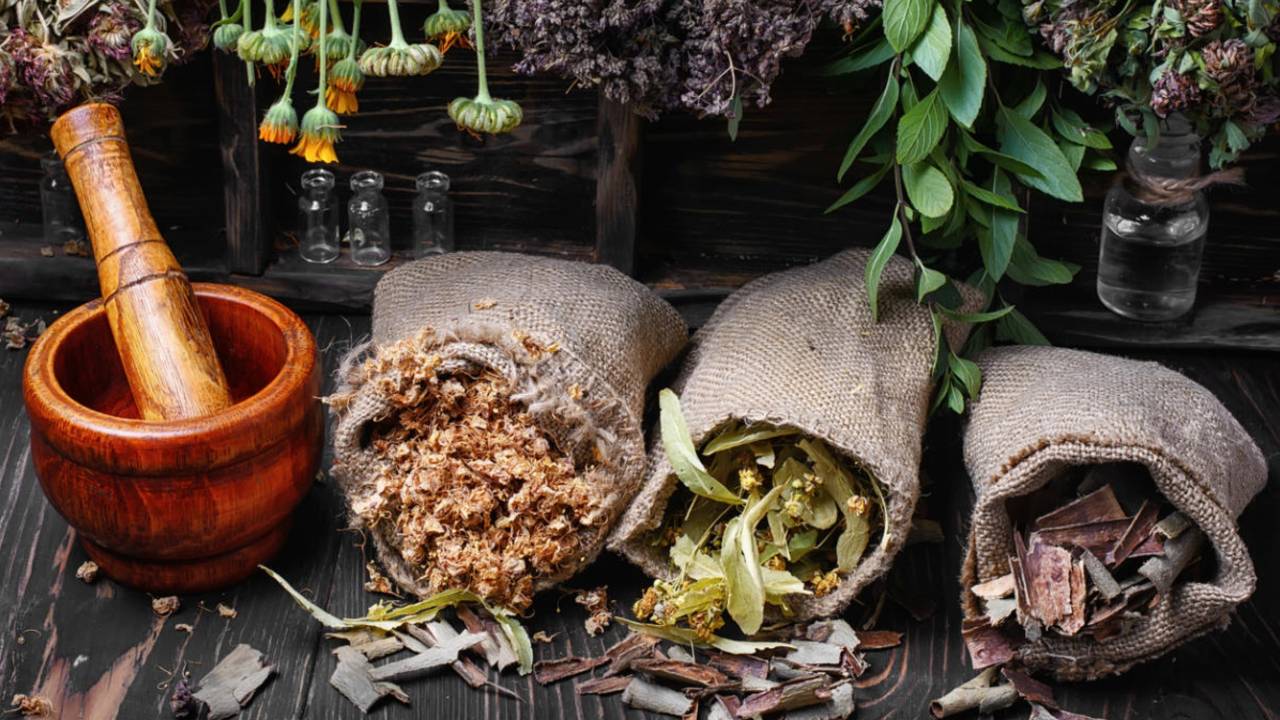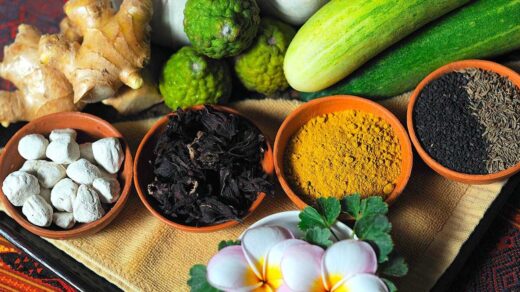Ayurvedic Plants List – Top 35 Herbs for Balancing Your Doshas
In Ayurvedic philosophy, plants are considered the soul of the earth, reflecting the harmony between our bodies and the natural world. According to Ayurveda, our bodies share the same elements as our environment and operate under the same universal principles.
Ayurveda identifies hundreds of medicinal plants used to rebalance the doshas as needed. These plants can significantly influence the doshas, enhance digestive health, regulate weight, boost intellectual abilities, and help prevent degenerative diseases, joint pain, and oxidative stress. Below is a list of some commonly used plants for balancing the three doshas.
Top 20 List of Ayurvedic Herbs to Balance Doshas
Ayurveda is an ancient science that has been practiced for centuries, focusing on the use of natural substances to maintain health and treat diseases. This holistic system utilizes a variety of substances including plants, minerals, flowers, leaves, fruits, and other natural elements to achieve its goals.
According to Ayurveda, well-being and health depend on the harmonious balance of the three doshas—Vata, Pitta, and Kapha. Each dosha represents a combination of the five elements (earth, water, fire, air, and ether) and plays a crucial role in maintaining physical and mental health.
To promote balance among the doshas, Ayurveda recommends the use of specific herbs, spices, and natural substances. Here is a list of some key substances effective in balancing the doshas:
1.Cardamom (Elaichi):
Cardamom is known for its unique, intense aroma and subtly sweet flavor, reminiscent of mint. In Ayurveda, it is valued for its antioxidant properties, which help protect cells from oxidative stress.
It also aids digestion, reduces bloating, and stimulates digestive transit. Its soothing effects on the digestive tract make it beneficial for balancing all three doshas, particularly Pitta.
2. Clove (Laung):
Clove has a warm, spicy flavor that enriches both sweet and savory dishes. It is renowned for its antibacterial and anti-inflammatory properties, which are beneficial for oral health and digestion.
Clove can soothe stomach upset and promote digestive health. It is also commonly used in spice blends to enhance overall flavor while supporting immune function and digestion.
3. Coriander (Dhania):
Coriander seeds are essential in many spice blends, including curry powder. They have a fresh, citrusy flavor that complements a variety of dishes.
Coriander aids digestion by stimulating enzyme activity and has potential aphrodisiac effects. It balances all three doshas but is particularly beneficial for soothing Pitta and Kapha.
4. Cumin (Jeera):
Cumin is a spice with a robust flavor profile that enhances many dishes. It helps stimulate appetite and aids in digestion by increasing digestive enzyme production.
Cumin also supports the circulatory system and helps balance all three doshas, including Vata, Pitta, and Kapha. Its warming nature makes it particularly beneficial for digestive health.
5. Turmeric (Haridra):
Turmeric is recognized by its vibrant orange-yellow color and earthy, slightly bitter flavor. It is renowned for its powerful antioxidant and anti-inflammatory properties.
Turmeric supports the digestive system by calming inflammation and protecting the stomach lining. It helps balance Kapha dosha and provides overall support for the body’s natural detoxification processes.
6. Ginger (Adraka):
Ginger, often referred to as the “king of spices,” is celebrated for its warming, spicy flavor and digestive benefits. It aids in digestion, reduces nausea, and has muscle-relaxing properties that facilitate breathing.
Ginger’s versatility makes it a staple in many dishes, enhancing both flavor and health benefits by stimulating circulation and digestion.
7. Nutmeg (Jaiphal):
Nutmeg is a spice with a warm, sweet flavor that enhances both sweet and savory dishes. It has digestive benefits and antiseptic properties, making it useful for soothing digestive discomfort and promoting overall health.
Nutmeg is often included in spice blends like garam masala and contributes to improved digestion and balanced flavor profiles.
8. Black Pepper (Kali Mirch):
Black pepper is known for its sharp, pungent flavor and is often used to enhance the taste of dishes. It aids in digestion by stimulating the digestive enzymes and helps in the absorption of nutrients.
Black pepper also boosts the effects of turmeric, making it a common addition to curry powders and spice blends to maximize health benefits.
9. Fenugreek (Methi):
Fenugreek is a versatile spice with a slightly bitter, nutty flavor. It supports metabolism, aids digestion, and helps regulate blood sugar levels.
Fenugreek stimulates energy metabolism and controls appetite while balancing Vata and Kapha doshas. However, it may increase Pitta if consumed in large amounts, so moderation is key.
10. Fennel Seeds (Saunf):
Fennel seeds have a sweet, aromatic flavor with a hint of licorice. They aid digestion by reducing bloating, gas, and indigestion, and support detoxification.
Balancing all three doshas, they are especially beneficial for calming Pitta and Kapha. Their antioxidant and anti-inflammatory properties enhance overall health.
These spices not only enhance the flavor of dishes but also play a significant role in maintaining and balancing the doshas according to Ayurvedic principles.
Top 5 List of Ayurvedic Herbal Mixtures
Ayurvedic herbal mixtures combine traditional herbs to support and balance bodily functions, promote wellness, and enhance overall vitality.
These formulations are designed to harmonize the doshas and address various health concerns through natural, holistic remedies. Below are a few lists.
1. Trikatu
Trikatu is a potent blend of three spices: Ginger (Adaraka), Black Pepper (Kali Mirch), and Long Pepper (Pippali). This mixture is known for its ability to activate digestion and enhance Agni, the digestive fire, ensuring that food is efficiently transformed into energy.
Trikatu stimulates the metabolism and supports the digestive system, making it particularly beneficial for individuals with a Kapha constitution, who may struggle with sluggish digestion.
2. Trimada
Trimada Churna is a comprehensive formula designed to support weight loss and metabolic regulation. This blend helps optimize the absorption of nutrients from food and promotes their transformation into usable energy.
By enhancing metabolic processes, Trimada assists in slimming and weight management. Suitable for balancing all three doshas, it aids in achieving a harmonious metabolic state and supports overall health.
3. Triphala
Triphala is a renowned herbal formula composed of three fruits: Amalaki (Indian Gooseberry), Bibhitaki, and Haritaki.
This blend is celebrated for its gentle yet effective cleansing action on the intestines, promoting regular bowel movements without harming the intestinal lining.
Triphala helps eliminate toxins, supports weight loss, and maintains digestive health. Each fruit in the Triphala blend addresses a specific dosha: Amalaki balances Pitta, Haritaki supports Vata, and Bibhitaki regulates Kapha.
4. Chyawanprash
Chyawanprash is a traditional Ayurvedic herbal jam formulated with a blend of herbs, including Amla (Indian Gooseberry), Ashwagandha, and a variety of other ingredients.
Known for its rejuvenating properties, it supports the immune system, enhances vitality, and promotes overall wellness.
Chyawanprash is beneficial for balancing all doshas, particularly useful for individuals experiencing fatigue or needing an energy boost.
5. Kachnaar Guggul
Kachnaar Guggul is a classic Ayurvedic formulation that combines Kachnaar (Bauhinia variegata) and Guggul (Commiphora wightii). This mixture is known for its detoxifying and anti-inflammatory properties, making it effective in supporting lymphatic health and promoting weight management.
It balances Kapha and Vata doshas, helping to manage fluid retention and inflammation in the body. These Ayurvedic herbal mixtures are designed to support various aspects of health and well-being, each with specific benefits for balancing the doshas and promoting overall harmony in the body.
These powerful Ayurvedic herbs and spices provide targeted support for balancing your doshas, optimizing your health, and harmonizing your body’s functions.


























The back pain therapy from the Saatwika Kerala centre is very scientific and effectual. There are essential things to consider before giving back pain treatment in Kerala. They include weakness of the muscle, weakness of the bone, and Vata vitiation. According to the state of the patient, the Ayurvedic therapies for back pain need about 14 to 28 days.
Saatwika offers unique back pain treatment in Kerala with a blend of herbal and modern therapies for adequate healing of the disease. The treatment process includes the ingestion of traditional medicines as well as external means with herbal drugs and Ayurvedic oils!
Thank you for your blog post regarding Indian Medicinal Plants and its benefits.
It was interesting to read. Continue posting more such blogs regarding Ayurvedic uses.
My tough constipation was fully cured by Triphala at my age of 86. this was a miraculous.